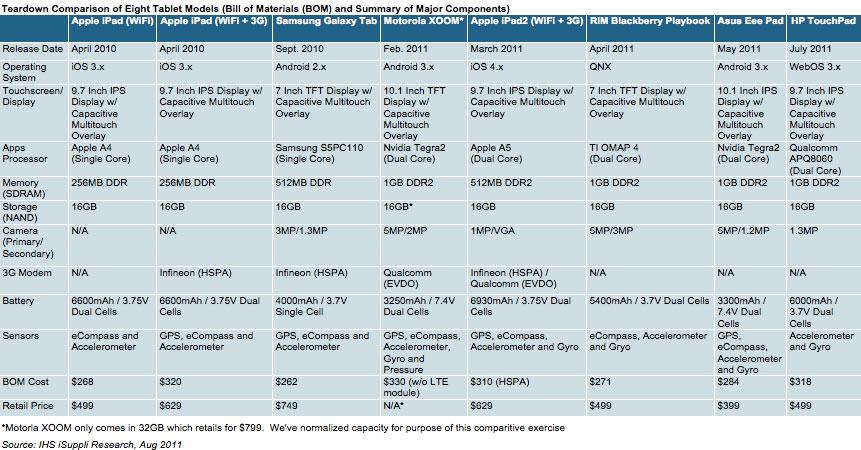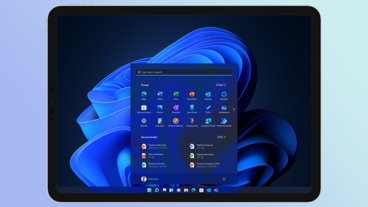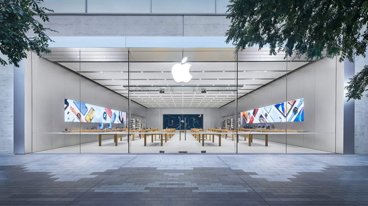IHS iSuppli this week revealed the results of its teardown analysis of eight different tablet models. They found that Apple's control of the iOS operating system allows it to reduce costs by limiting memory quantity and utilizing thinner batteries.
The iPad 2, for example, features just 512 megabytes of SDRAM, which is half the 1 gigabyte found in most competing tablets. That memory density reduction affords Apple a nearly $14 reduction in the build of materials for the iPad 2 compared to other tablets.
By controlling iOS, Apple can ensure that its proprietary mobile operating system features efficient memory usage, and allows the company to build a device with less RAM.
"Since Apple controls both the operating system and hardware design of the iPad, it is able to attain design efficiencies that other tablet manufacturers cannot," said Wayne Lam, senior analyst of competitive analysis at IHS. "These efficiencies become obvious in areas like the memory and the battery, where Apple maintains advantages in cost, space savings and performance compared with every competitor in the business."
Included in the comparison were three iPad models from Apple: both the first-generation Wi-Fi-only and 3G models, as well as the 3G-capable iPad 2. Also tested were the 7-inch-class Samsung Galaxy Tab and RIM BlackBerry PlayBook; while around the 10-inch screen size were the Motorola Xoom, Asus Eee Pad, and HP TouchPad.
Most tablets that compete with the iPad come from blueprints and reference designs outsourced to third parties. But Apple maintains tight control of the design of its devices, as well as components and contract manufacturers.
"Apple takes a vertically integrated approach to its products, from the operating system to the user interface, to the hardware design, down to the selection of individual parts used in the device," Lam said. "For example, Apple even uses its own applications processor design in both the iPad and iPad 2.
"In contrast, Android tablet makers buy those capabilities from the likes of Nvidia, Texas Instruments and Qualcomm. This gives Apple greater control in multiple areas of product development."
The analysis noted that Apple has sent all of the trends in the tablet market, forcing manufacturers to gravitate toward the $500 "sweet spot" for pricing. And while early competitors embraced the 7-inch form factor, a decision which Apple Chief Executive Steve Jobs derided, they have since moved toward the same size range as the 9.7-inch screen on the iPad.
 AppleInsider Staff
AppleInsider Staff







-m.jpg)






 Wesley Hilliard
Wesley Hilliard
 Christine McKee
Christine McKee
 Malcolm Owen
Malcolm Owen
 William Gallagher
William Gallagher
 Andrew Orr
Andrew Orr







-m.jpg)




78 Comments
Even the original iPad with 256MB of RAM was surprisingly snappy. The iPad 2 is even better which makes me wonder why competitors tout 1GB of RAM yet their tablets perform sluggishly.
Computers today, now more than ever, have to be properly balanced yet the Android market is mirroring the PC market by marketing speeds and feeds to consumers like these mobile devices are Wintel. Fallacious.
Even the original iPad with 256MB of RAM was surprisingly snappy. The iPad 2 is even better which makes me wonder why competitors tout 1GB of RAM yet their tablets perform sluggishly.
Computers today, now more than ever, have to be properly balanced yet the Android market is mirroring the PC market by marketing speeds and feeds to consumers like these mobile devices are Wintel. Fallacious.
That's probably part of the reason Google and (most of?) the rest of the handset alliance is trying to standardize hardware, making it easier to optimize the software used to run it.
Even the original iPad with 256MB of RAM was surprisingly snappy. The iPad 2 is even better which makes me wonder why competitors tout 1GB of RAM yet their tablets perform sluggishly.
Computers today, now more than ever, have to be properly balanced yet the Android market is mirroring the PC market by marketing speeds and feeds to consumers like these mobile devices are Wintel. Fallacious.
Those tablet makers are trying to pull 90's techonomics where pretty much everything ran the same Window OS so you could use HW specs to judge which machine would be snappier. That simply doesn't hold when you are using a different OS for each vendor.
...I have owned both iPad 1 and 2, and even with 512MB in the iPad 2, web browsing is horrible - and I won't accept Apple fanbois (of which I am one when they yet things right, such as the MB Air 11"), but 1. Scrolling on a web page is nasty with iPad Safari - the content jumps back up to the top if some content is still loading, something that never happens on any other browser. 2) Worse, and some of us thought this would be cured with iPad 2, content keeps reloading every time you switch pages - this causes havoc if you are posting comments, logged into a service, or just want to go back read something you loaded earlier, but do NOT want updated because the content may change.
Apple are doing this on purpose to force people who NEED their products to work properly to upgrade. I am willing to bet iPad 3 will NOT do this, yet every Android tablet I know, including those costing just £70 are able to open MULTIPLE web pages properly.
I am VERY angry at Apple for manipulating their customers and glad that I can remain impartial and not be brainwashed, despite having owned almost every computer or iOS product they have ever made, other than PowerMac or Mac Pro.
I expect this massive usability flaw in iOS for iPad Safari to be fixed in iOS 5 else I am selling the iPad 2 and getting a Motorola Xoom, LG or Samsung Galaxy Tab.
Ii though for a scond that this is BGR